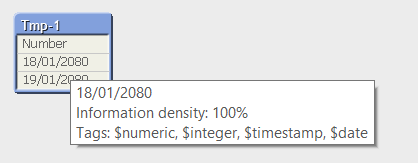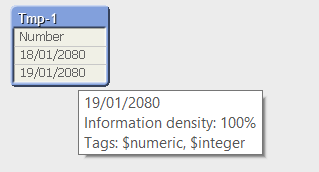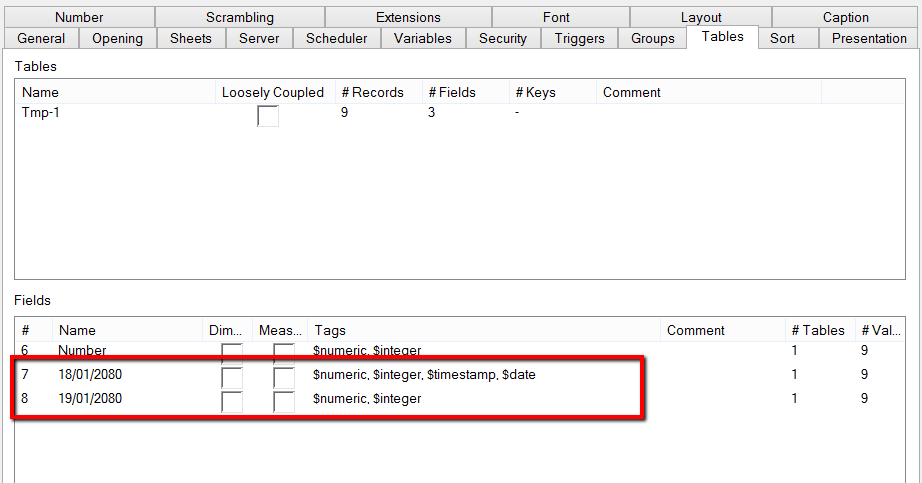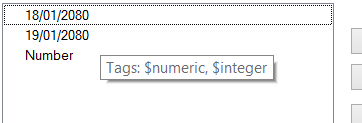Unlock a world of possibilities! Login now and discover the exclusive benefits awaiting you.
- Qlik Community
- :
- All Forums
- :
- QlikView App Dev
- :
- Timestamp MAKEDATE(2080,01,18) v MAKEDATE(2080,01,...
- Subscribe to RSS Feed
- Mark Topic as New
- Mark Topic as Read
- Float this Topic for Current User
- Bookmark
- Subscribe
- Mute
- Printer Friendly Page
- Mark as New
- Bookmark
- Subscribe
- Mute
- Subscribe to RSS Feed
- Permalink
- Report Inappropriate Content
Timestamp MAKEDATE(2080,01,18) v MAKEDATE(2080,01,19)
Hi All,
I have stumbled across an issue with Tags for Timestamps
Why does Qlikview Tag 18/01/2080 as $numeric,$integer,$timestamp,$date.
But it Tags 19/01/2080 as $numeric,$integer
Why does it not read 19/01/2080 as a Timestamp or a Date
Regards
Alan
- « Previous Replies
-
- 1
- 2
- Next Replies »
- Mark as New
- Bookmark
- Subscribe
- Mute
- Subscribe to RSS Feed
- Permalink
- Report Inappropriate Content
maybe the limit of the numerical representation of dates?
- Mark as New
- Bookmark
- Subscribe
- Mute
- Subscribe to RSS Feed
- Permalink
- Report Inappropriate Content
The end is coming, eventually...
![]()
- Mark as New
- Bookmark
- Subscribe
- Mute
- Subscribe to RSS Feed
- Permalink
- Report Inappropriate Content
anything past 21st december 2012 is futile anyway
![]()
- Mark as New
- Bookmark
- Subscribe
- Mute
- Subscribe to RSS Feed
- Permalink
- Report Inappropriate Content
Right, some early calendar bug.. ![]()
However, 2080-01-19 still works as a date..
- Mark as New
- Bookmark
- Subscribe
- Mute
- Subscribe to RSS Feed
- Permalink
- Report Inappropriate Content
as the date calculations seem to work correctly with dates after 19/01/2080, maybe it's just a bug of the table viewer?
Maybe you could report it?
regards
Marco
- Mark as New
- Bookmark
- Subscribe
- Mute
- Subscribe to RSS Feed
- Permalink
- Report Inappropriate Content
Thanks Ralf,
I got a similar response from Stephen Redmond, I think it was
"Because that is when the world ends?"
Anyway it appears in Table Viewer, Also in Tables tab in Document Properties and when you hover over the field name after reload it shows tags as $numeric $integer but not $timestamp $date
Regards
Alan
- Mark as New
- Bookmark
- Subscribe
- Mute
- Subscribe to RSS Feed
- Permalink
- Report Inappropriate Content
Please see the below images





- Mark as New
- Bookmark
- Subscribe
- Mute
- Subscribe to RSS Feed
- Permalink
- Report Inappropriate Content
QlikView has some functionality that, unless otherwise specified, will automatically interpret integers in a particular range as dates and will tag them accordingly.
I am not sure that it will break anything. The fields are still stored as dates, they still take up 20 bytes each, they still work with Set Analysis expressions using the text dates. All is good, except for the tag. If that was going to be a concern, you can always manually tag it:
Tag Date1 with '$timestamp';
Tag Date1 with '$date';
Tag Date2 with '$timestamp';
Tag Date2 with '$date';
- Mark as New
- Bookmark
- Subscribe
- Mute
- Subscribe to RSS Feed
- Permalink
- Report Inappropriate Content
Thanks Stephen.
It's not a concern to be honest I was just wondering why it did not Tag dates after 19/01/2080 with $timestamp and $date
Regards
Alan
- « Previous Replies
-
- 1
- 2
- Next Replies »